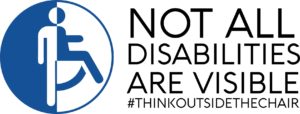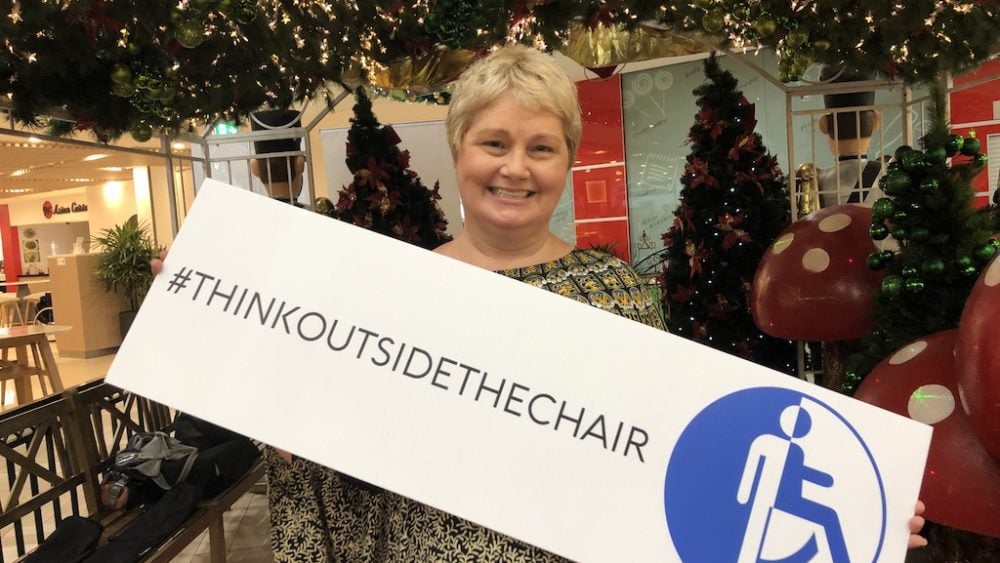When Marni Walkerden was abused for parking in a disabled car space, she didn’t intend to spark a global revolution. But this is precisely the outcome that has eventuated for this unassuming Aussie from the central coast of NSW.
Until seven years ago, Walkerden didn’t even identify as someone with a disability. While she had spent her life with a condition that affects mobility – hereditary spastic paraplegia – it was not until she began finding it difficult to walk longer distances that she applied for a special parking permit.
And it was only at this point in her life that Walkerden experienced the full extent of misconceptions about disability in the community.
“When I got my mobility parking permit, I was surprised that when I got out of my car sometimes, people would look at me and say, ‘You can’t park there. You’re not disabled’ or ‘You’re not old enough’ or ‘Where’s your wheelchair?’… People would say something before they’d even looked at my permit,” she explains to Eternity.
“There’s so many disabilities that aren’t visible, like mine.” – Marni Walkerden
When Walkerden started working as a coordinator for Ability Links NSW, which connects people living with a disability and their families to community services, she began to realise that she was not alone in copping the effects of misguided prejudice.
“The more people I spoke to through my work in my personal life, the more people I found were experiencing a similar problem – that if they didn’t get out of the car with a wheelchair, then they would often get dirty looks or rude comments from people,” she says.
“It’s amazing when you start the conversation how many people then say, ‘I’ve had that experience’ or ‘I know somebody who has had that experience’ or ‘I get so sick of going anywhere because I just don’t want to get told off.’ Some of the stories that I’ve seen, people have just been devastated by the way that they’ve been treated by people. You don’t realise the extent of it.”
Walkerden came to a realisation about one cause for this lack of understanding: “I realised that the international symbol for disabilities is a person in a wheelchair, so that’s how people have been conditioned to see disability. But there’s so many disabilities that aren’t visible, like mine. Unless someone really watches me walk, they don’t notice.”
So, she set about changing people’s perceptions by launching a campaign.
“My idea for the campaign was just to make a video that may eventually become like a community service announcement – just to make people aware, without being judgmental.”
She gathered a small committee and partnered with Fairhaven Services (a disability support provider on the central coast), Blue Badge Insurance Australia and Somo Society, a digital marketing agency that came up with the catchy hashtag “#ThinkOutsideTheChair” and created a website that included a few educational videos, as well as downloadable signs and bumper stickers. The idea was for people to display the signs in their workplace, church or elsewhere, and snap a photo using the hashtag to connect with the growing network of supporters.
While the initial aim was to create awareness about the breadth of people who require disability parking permits – such as those with autism, mental health issues or who have limited mobility – it soon moved beyond this issue.
“I found the same thing happens with accessible toilets – people might need an accessible toilet but they’re not necessarily in a wheelchair … and they got a dirty look or get told off as they come out. So, [the campaign] just became in general more about that not all disabilities are visible,” Walkerden explains.
“They were saying this lady from the central coast of Australia wants to change the international symbol for disability.” – Marni Walkerden
In the same way that the focus of the Think Outside the Chair campaign grew, so too did its purpose and reach. The unique logo that incorporates a picture of a person standing with someone in a wheelchair (designed by Somo Society) began to capture world attention.
When the campaign launched last December at a local shopping on the central coast, it received national coverage on the ABC, created a flurry of activity on social media and attracted the attention of audiences in the Philippines, Scotland, Canada and the United States.
 “They were saying this lady from the central coast of Australia wants to change the international symbol for disability,” says Walkerden.
“They were saying this lady from the central coast of Australia wants to change the international symbol for disability,” says Walkerden.
She clarifies: “We’re not necessarily saying that we want to replace the other emblem. But it’s amazing how people have actually taken that on board now and started a whole different discussion … Once the conversation got going, we realised that that international symbol just creates an awareness around disability that isn’t necessarily true.”
Now, just a few months after launching, the campaign is continuing to gain momentum. Walkerden is hoping to secure government funding and corporate sponsors, and discussions with local businesses are already under way. She is hoping the video may be screened as a community awareness advertisement in local cinemas, and their signs are already being displayed at Imperial Shopping Centre in Gosford (where the launch was held). She is also in discussion with Hope UC Church (where Walkerden worships) about posting the signs in carparks at its campuses in Australia, America and India.
“Churches aren’t there to be support workers, but I think they can set an example about inclusion.” – Marni Walkerden
Walkerden believes churches play a key role in shifting community perceptions about disability, and in nurturing an inclusive, welcoming environment.
“As a Christian (and outside my role at Ability Links), my personal opinion is that churches can play a major part in being accepting and showing community that you’re there to love everyone and you’re there to treat people the same.”
As in the community at large, some churches still have a way to go in changing their culture.
“Some churches might say, ‘Well, we’ve got some wheelchair access here,’ but then they don’t have the same attitude to someone who may have a mental health issue.”
She suggests a few practical ways for churches to remedy this: run disability awareness seminars for staff and volunteers; promote your church’s accessibility features on the website – such as a hearing loop, accessible parking and access and sensory toys for kids; provide accessible seating for church services and at events; offer help to transport those with mobility restrictions to appointments; take care with the language you use by focusing on the person, not their disability; and include people into regular programs – “treat people the same – find a way to accept them and make them feel part of the group, like everybody else.”
“Churches aren’t there to be carers or people in churches aren’t there to be support workers, but I think they can set an example about inclusion,” says Walkerden.
“I think churches are in a perfect place to show that grace and love to people and acceptance. If the church sets an example, then the rest of community can do the same.”
Email This Story
Why not send this to a friend?


